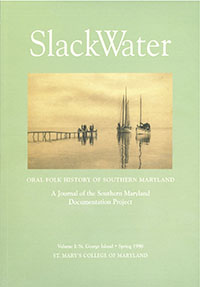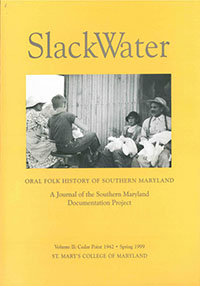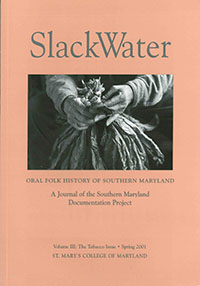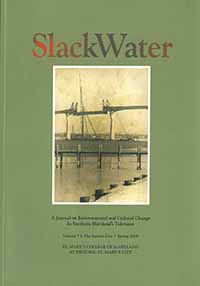We Can't Serve You All In Here
Fred Harold Talbert was interviewed by Loni Singer for the Southern Maryland Documentation Project in 1991 when he was 81 years old. Born in Arkansas, Mr. Talbert came to St. Mary's County in 1946, where he worked in the transportation division at the Patuxent River Naval Air Station, retiring after 33 years of civil service and two years in the US Army. He and his wife, Jeanette Thompson Talbert, raised their family in Valley Lee. His daughters, Janice Talbert Walthour and Elfreda Talbert Mathis, became educators and continue to follow in their father's footsteps by working for the public good. Mr. Talbert passed away in 2004.
Here Mr. Talbert speaks about his activism during the times surrounding Maryland's Open Accommodations Law and the Civil Rights Act of 1964, which prohibited racial discrimination in public accommodations.
When I first come in the county [1946]. I saw that things wasn't progressive at all. And I was living in a progressive status, although I came from the South [Arkansas]. [After I got here] I wanted to leave. [But] you can't whip a thing by running away. So I joined everything I could join. We organized a little civic organization. And then I was living in Carver Heights [a segregated Lexington Park subdivision], fellows named John Tarpley and George Grymes would meet down in the alley in Leonardtown at the old hall.
We used to have our meetings down there to make things better. We worked on public accommodations. Because your theaters and your hospital at that particular time, black people couldn't go in the front door. Black people went around in the emergency department to get admitted to St. Mary's Hospital. Then, when you went to visit somebody, you had to go up the fire escape on the outside.
I think the hospital wanted a loan from the governor. They wanted to put a new wing on St. Mary's Hospital, so we met down at Colton's Point. Harry Graves had a recreation place down there. Mostly all black would come there from all over the state. And the man asks if we would make a donation towards putting this new wing onto the hospital. And we told him we was willing to make a donation, if the blacks could go in the front of St. Mary's Hospital just like everybody else could. And, we want him to do away with that fire escape. So they said they would do that. The black people, you know, they paid their share of it. So they put the new wing on.
Fred Talbert traveled around the community asking local proprietors to open the doors of their establishments and to offer seats at their lunch counters to blacks.
We went to [one] drugstore owner and asked him about serving blacks if they come into his lunch counter. He said, 'Oh yes. Y'all can come on in. Now that lady that's on the lunch counter, she might not serve you, but I'll serve you until I get somebody that will serve you.' So that opened that up.
Next we went to the other drugstore, and he said, 'Oh you can come on in, but if you steal something [laughs], somebody steals something, I'm going to call a lawyer and have them put in jail.' So we went in there and it wasn't too long before he closed his lunch counter. Then, at the cut-rate drugstore, [the owner] said, 'I haven't put up any sign that blacks can't come in and, you know, eat at my lunch counter.' So that was that.
[Regarding a restaurant in Leonardtown] I said, 'Well, let's go over to the lunch counter and have a cup of coffee and a sandwich.' All the whites stood up when the blacks walked in. They thought it was one of them sit-ins [laughs]. And it wasn't any sit-in. The woman that was serving back there, she said, 'We can't serve you all in here.' We got up from the counter and was going out, and in the meantime, the sheriff came in. Wasn't any arrests made or anything like that. But anyway, about a month from then, the man opened his place up to the public.
And so it continued. Mr. Talbert tried to open the local theaters: there were balconies for blacks, and seats in the back for blacks, and fire escape exits for blacks, and special times and special movies for blacks. And he heard excuses like:
'It's a better view on the balcony,' and 'I'm not going to put up no sign saying that you can come, and I'm not going to put up no sign that you can't come. If you come, I'm going to take that money. Because when I take that money to the bank, they ain't gonna know whether it's black money or white money.' So I went, and I don't think I ever went back anymore.
But this public accommodations, that was the hardest thing we had to go through. If a black person wanted something to eat, he had to go around the back to get it. So we went to Annapolis, I, the NAACP, and people from all over Maryland. We were there by the busloads. And when John Glenn made his orbit, we orbited the state house in Annapolis, sang our song.
At the conclusion of his interview, Mr. Talbert handed the interviewer a pamphlet.
Did you see this down at the College? They have a bust of him down on the water there. He came here to St. Mary's City as an indentured servant.
He was referring to Mathias de Sousa, who, in the 17th century, was the first person of African descent to participate in a meeting of the Maryland Assembly.
-----
Be sure to listen to Mrs. Emma Hall (audioclip, right), as she describes the discrimination she and her friends experienced on a hot day when they went to purchase a soda in a local store. Used with permission from the United Committee for Afro-American Contributions.










